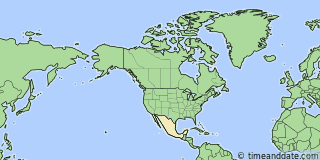Mar 8, 2026, 2:00 am
In small parts of Mexico
| Country: | Mexico |
|---|---|
| Long Name: | United Mexican States |
| Abbreviations: | MX, MEX |
| Capital: | Mexico City |
| Time Zones: | 4 |
| Dial Code: | +52 |
Note: Only some parts of Mexico use DST in 2027.
Mar 14
Forward 1 hour
Mar 14, 2027 - Daylight Saving Time Starts
When local standard time is about to reach
Sunday, March 14, 2027, 2:00:00 am clocks are turned forward 1 hour to
Sunday, March 14, 2027, 3:00:00 am local daylight time instead.
Sunrise and sunset will be about 1 hour later on Mar 14, 2027 than the day before. There will be more light in the evening and less light in the morning.
Also called Spring Forward, Summer Time, and Daylight Savings Time.
Nov 7
Back 1 hour
Nov 7, 2027 - Daylight Saving Time Ends
When local daylight time is about to reach
Sunday, November 7, 2027, 2:00:00 am clocks are turned backward 1 hour to
Sunday, November 7, 2027, 1:00:00 am local standard time instead.
Sunrise and sunset will be about 1 hour earlier on Nov 7, 2027 than the day before. There will be more light in the morning and less light in the evening.
Also called Fall Back and Winter Time.
When Does DST Start and End in Mexico?
Most of Mexico, including its capital Mexico City, doesn't use Daylight Saving Time (DST). However, some exceptions exist for the locations that follow the DST schedule of the United States:
- Baja California observes DST and uses the same time zones as neighboring California in the US. Here, the DST period starts on the second Sunday in March and ends on the first Sunday in November.
- Sonora does not change its clocks to stay in sync with the neighboring US state of Arizona, where Mountain Standard Time (MST) is observed all year.
- Municipalities near the country's northern border with the US keep the DST schedule for practical and socioeconomic reasons. This includes the municipalities Ciudad Juárez and Ojinaga in Chihuahua, Colombia in Nueva Leon, and Reynosa in Tamaulipas.
Which States and Federal Districts use Daylight Saving Time in 2027

Areas in Mexico on standard time all of 2027
DST in States and Federal Districts in Mexico in 2027 | |||||
|---|---|---|---|---|---|
| Aguascalientes | No DST | Guanajuato | No DST | Querétaro | No DST |
| Baja California | Mar 14 – Nov 7 | Guerrero | No DST | Quintana Roo | No DST |
| Baja California Sur | No DST | Hidalgo | No DST | San Luis Potosí | No DST |
| Campeche | No DST | Jalisco | No DST | Sinaloa | No DST |
| Chiapas | No DST | Michoacán | No DST | Sonora | No DST |
| Chihuahua (north) | Mar 14 – Nov 7 | Morelos | No DST | Tabasco | No DST |
| Chihuahua | No DST | México | No DST | Tamaulipas (north) | Mar 14 – Nov 7 |
| Ciudad de México | No DST | Nayarit | No DST | Tamaulipas | No DST |
| Coahuila de Zaragoza (north) | Mar 14 – Nov 7 | Nuevo León (north) | Mar 14 – Nov 7 | Tlaxcala | No DST |
| Coahuila de Zaragoza | No DST | Nuevo León | No DST | Veracruz | No DST |
| Colima | No DST | Oaxaca | No DST | Yucatán | No DST |
| Durango | No DST | Puebla | No DST | Zacatecas | No DST |
Daylight Saving Time History in Mexico
- Mexico first observed Daylight Saving Time in 1931.
- Mexico has observed DST for 70 years between 1931 and 2025 (DST in at least one location).
- Previous time with no Daylight Saving Time was 1975.
- See Worldwide DST Statistics
Baja California Pioneered DST
The state of Baja California introduced seasonal clock changes in 1931, remaining the only area in Mexico with a DST schedule for 65 years.
In the rest of the country, DST was introduced in 1996 and removed in 2022.
